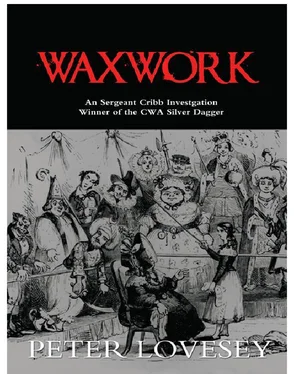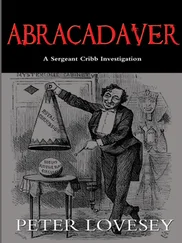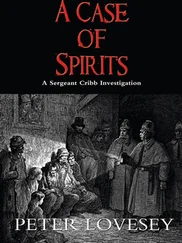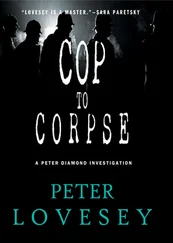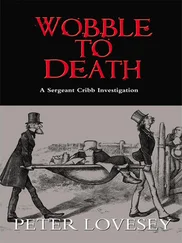Peter Lovesey - Waxwork
Здесь есть возможность читать онлайн «Peter Lovesey - Waxwork» весь текст электронной книги совершенно бесплатно (целиком полную версию без сокращений). В некоторых случаях можно слушать аудио, скачать через торрент в формате fb2 и присутствует краткое содержание. Жанр: Исторический детектив, на английском языке. Описание произведения, (предисловие) а так же отзывы посетителей доступны на портале библиотеки ЛибКат.
- Название:Waxwork
- Автор:
- Жанр:
- Год:неизвестен
- ISBN:нет данных
- Рейтинг книги:3 / 5. Голосов: 1
-
Избранное:Добавить в избранное
- Отзывы:
-
Ваша оценка:
- 60
- 1
- 2
- 3
- 4
- 5
Waxwork: краткое содержание, описание и аннотация
Предлагаем к чтению аннотацию, описание, краткое содержание или предисловие (зависит от того, что написал сам автор книги «Waxwork»). Если вы не нашли необходимую информацию о книге — напишите в комментариях, мы постараемся отыскать её.
Waxwork — читать онлайн бесплатно полную книгу (весь текст) целиком
Ниже представлен текст книги, разбитый по страницам. Система сохранения места последней прочитанной страницы, позволяет с удобством читать онлайн бесплатно книгу «Waxwork», без необходимости каждый раз заново искать на чём Вы остановились. Поставьте закладку, и сможете в любой момент перейти на страницу, на которой закончили чтение.
Интервал:
Закладка:
The Clerk of the Court faced the dock. ‘Miriam Jane Cromer, you have confessed yourself guilty of the wilful murder of Josiah Perceval. Have you anything to say why the court should not pronounce sentence upon you?’
Her left hand moved towards the rail. The rings on the third finger glittered in the light.
‘You must answer,’ said the judge.
‘I have nothing to say, my lord.’
The oblong of cloth known as the black cap was placed on the judge’s head.
‘Prisoner at the bar, you have been convicted on your own admission of the dreadful crime laid to your charge. I have studied the evidence and examined the deposition you made concerning your actions and I can entertain no doubt as to your guilt. That the deceased by your account behaved shamefully and criminally towards you I concede, but whether that may be weighed in mitigation is not for me to say. There were other remedies open to you than murder, which is the most heinous of all crimes. I am bound to say that yours was an odious form of murder. The use of poison necessarily involves an element of calculation. This was not an impulsive act; it was a crime deliberately planned. You carried it out in cold blood.
‘As I have already made clear to you, the law leaves me no discretion, and I must pass on to you the sentence of the law; and it is that this court doth ordain you to be taken hence to the place from whence you came, and from thence to the place of execution, and that you be there hanged by the neck until you are dead; and that your body be afterwards buried within the precincts of the prison in which you shall have been confined after your conviction, and may the Lord have mercy on your soul.’
The eyes of everyone were on the small figure in the dock. The sentence had not disturbed her waxlike stillness. A wardress touched her arm to indicate that she must turn and go down the steps. She inclined her head, turning to her right, away from the judge. For a moment her eyes appeared to linger on someone in the well of the court. Then she allowed the wardresses to lead her down and out of sight.
That ritual over, another began. On the steps down from the dock the wardresses gripped the prisoner firmly by each arm. In the brown-tiled passage underneath they held her upright while the doctor adminstered sal volatile. Whether it was required was not considered. They took her into a room and sat her on a bench. The doctor offered brandy, but she shook her head. She appeared to be in control. The doctor took her wrist and felt the pulse.
The chaplain who had waited unobtrusively came forward, opening his Bible.
Miriam Cromer turned to one of the wardresses and asked, ‘When will you be taking me back to the prison?’
‘When you are fit to walk.’
‘I can walk now.’ Before the chaplain could begin his spiritual comfort she told him, ‘I am not ungrateful, but at this moment I want to be taken wherever I must and then left alone.’
The doctor nodded his assent. The wardresses, both strong women, took hold of her arms and practically lifted her from the bench.
The Central Criminal Court was linked with Newgate by a stone passage open to the elements. It was commonly known as Birdcage Walk, from the iron bars in default of a roof. The rain was teeming in.
They hustled her forward, heads bowed. After a few steps she hesitated, her attention caught. At intervals capital letters had been crudely chiselled in the flagstones. Isolated letters. ‘Better you don’t ask,’ one of the wardresses told her firmly. ‘Take a squint at the sky. You won’t see much of it where you’re going.’
There was a stone porch at the end. They stood there breathing rapidly from the quick walk through the rain while a turnkey opened the iron-plated door to the prison.
Newgate had undergone extensive alterations thirty years before, but the essential structure was still the four-foot masonry of 1782. The granite blocks stood as they had for a century, undisguised by tiles or plaster, grey at the entrance, lime-washed in the passages ahead.
She was taken into a stone-floored room on the right and brought before a blue-uniformed man at a desk. For more than a minute the group of three women waited in silence while he finished writing something. Then he looked up and confirmed her name and sentence with the wardress on the left.
He addressed the prisoner: ‘Christian names?’
‘Miriam Jane.’
‘Sir,’ one of the wardresses prompted her.
‘Sir.’
‘Address?’
She paused, frowned faintly, and gave it.
‘Date and place of birth?’
‘23rd March, 1862. Hampstead. Sir.’
‘Next of kin?’
‘That would be my husband Howard.’
‘His full name?’
‘Mr Howard Cromer, sir.’
‘His address?’
‘The same as mine.’
‘Religion?’
‘His, or mine, sir?’
The officer looked up from his writing to decide whether sarcasm was intended.
‘Church of England, sir.’
He ordered her to hand over any personal possessions.
She gave him her reticule, locket and engagement ring. She was allowed to keep her wedding ring.
He pushed a paper towards her and told her to sign it. With a firm hand, she wrote her name in full.
Another key was turned and she was taken further into Newgate. Each time a door slammed, the sound reverberated through the building, conjuring an impression of numberless catacombs.
They mounted an iron staircase to the women’s wing. Nothing about it was suggestive of femininity. The walls were as solid as the rest of Newgate. A door lined with sheet-iron led into a stone-flagged passage. At the end was a door marked Lady Superintendent. They knocked and ushered the prisoner in.
‘Come forward, Cromer, and stand where I can speak to you without raising my voice. I am Miss Stones, and I shall be responsible for you while you are here.’ Miss Stones spoke with the stiff but not unfriendly manner of a schoolmistress. She was a small, birdlike woman in her fifties, dressed in a grey uniform. Her bonnet was made of better stuff than the wardresses wore. ‘There is little that I need to say to you now. We shall get you to your cell as soon as we are able. The regulations stipulate that you must be attended by two prison officers day and night and visited each day by the governor, the chaplain and me. You may also receive visits from your family and your legal advisers. You are permitted to exercise at times when the other prisoners are in their cells and you may attend Morning Service in the Chapel on Sunday. You will address the officers as “miss” and me as “madam”. Is that fully understood?’
‘Yes, madam.’
Having recited her set piece, Miss Stones took a lace handkerchief from her sleeve and opened it sufficiently for an aroma of cheap scent to declare its presence. In a refined accent she said, ‘I am not unaware of the sensibilities of a woman of your position subjected to prison discipline. The regulations, of course, must be obeyed at all times, but there is no reason for you to suffer excessively. If you require something to induce sleep it can be provided.’
‘Thank you, madam.’ The prisoner answered as mechanically as Miss Stones had begun. Her eyes were empty of any emotion.
The prison staff recognised her manner as indicative of a state of shock they had met before in prisoners straight from sentencing. Quite soon she was likely to be weeping, possibly to the point of hysteria.
Miss Stones nodded to the wardresses. They took the prisoner out and into a passage lined with cell doors.
‘My name is Bell,’ one of them said. She was solid like the walls, and had a pugnacious cast of face, but the voice softened the impression. Before that morning Bell had been prepared to dislike the prisoner as one of the genteel class who thought of themselves as ladies and would no doubt expect to be treated as such, in spite of having savagely murdered a fellow-creature. Yet the manner in which she had stood in the dock and looked that judge in the eye as she had received her sentence and the way she had conducted herself since spoke something for her courage, Bell admitted. ‘You’ll be seeing plenty of us-Hawkins and me. We do an eight-hour turn, you see, then another pair take over. Six to two this week-that’s the easy turn.’ She continued talking about the prison routine without interruption from Hawkins, a wiry, thin-faced woman who looked underfed.
Читать дальшеИнтервал:
Закладка:
Похожие книги на «Waxwork»
Представляем Вашему вниманию похожие книги на «Waxwork» списком для выбора. Мы отобрали схожую по названию и смыслу литературу в надежде предоставить читателям больше вариантов отыскать новые, интересные, ещё непрочитанные произведения.
Обсуждение, отзывы о книге «Waxwork» и просто собственные мнения читателей. Оставьте ваши комментарии, напишите, что Вы думаете о произведении, его смысле или главных героях. Укажите что конкретно понравилось, а что нет, и почему Вы так считаете.
